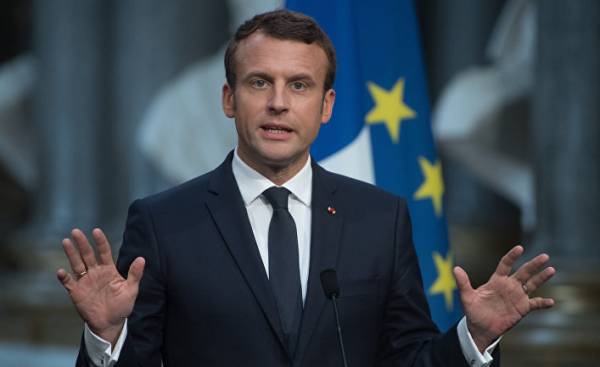
GENEVA — Emmanuel macron wins one victory after another. In just a year he went from being an inexperienced political outsider, did not have the support of the establishment, to the President of the French Republic and leader of a new political party, which received an impressive majority in Parliament. Will he be able to continue in the same spirit?
The recent success of Macron explained not only by fortune, but also his ability to use the mistakes of others. Voters have lost confidence in the political establishment, he offered an attractive option that did not require them to shift to the extremes, right or left. It began to be perceived as smart the destroyer of destructive populism.
Especially reasonable were the economic program of Makron: it was an excellent response to the ongoing for more than a decade of analysis of diseases afflicting the French economy. He promised to release a completely ossified labour market; to relieve the excessive tax burden, stifling entrepreneurship; finally, to reduce the economic size of the swollen French state (his annual expenses are 57% of GDP) by partial cancellation of cumbersome regulation and rationalization of legacy systems of social protection.
After the election macron maintained its image as a “breath of fresh air”, forming quite young, a motley of government may be inexperienced, but smart and enthusiastic people. Those who have long lamented the economic decline of France, could not believe the miracle that was unfolding in front of them.
But high expectations could portend a big disappointment. And the first signals from the Makron were alarming. The promised reform of the labour market and is actively preparing can be approved in September, however, the macroeconomic program of the government, formulated by Prime Minister Edouard Philippe, was a serious disappointment.
Philip said it plans to reduce public spending by only three percentage points of GDP within five years. He also set aside a few reasonable decisions about tax cuts stimulating economic growth, and some of them deferred until 2022, the expiration of the current term of the Macron. A couple of days later Makron changed course, slightly speeding up the process of reducing some taxes. But he is going to raise social security tax in 2018, presenting it in the form of partial compensation of the reduction of other taxes.
In defense of this approach, Philip referred to the court of auditors (Cour des Comptes), the official body supervising the state finances, which reported serious budget overruns in 2017, resulting from a hypocritical campaign promises of the former President françois Hollande. The new government must bring the budget deficit to 3% of GDP, as promised by France last year to its European partners. Philip claims that it is a matter of trust.
However, the satisfaction of bureaucrats in Brussels and Berlin is threatened by the weakening of economic recovery began in France and, accordingly, support the new President of the country, precisely at the moment when it is necessary to carry out important, sometimes unpopular reforms. (Today the per capita GDP barely exceeds pre-crisis level and unemployment began to decline only last year). European leaders, would probably be a slight excess of the budget deficit than the loss of popular support for the Pro-European President of France because of the reduction in government spending.
Macron needs to understand these things. Then why is he assumes this macroeconomic risk? And, more importantly, does this step on what will be his presidency in the future?
According to the most positive interpretation, the Makron decided to focus on a deep and courageous reforms, and macroeconomic issues approached with caution, in much the same way as his predecessors, Nicolas Sarkozy and Hollande. Both rejected the policy of reducing government spending, but still have it to spend.
However, when Sarkozy and Hollande have begun to support measures to reduce government spending, they saw their ratings public support rapidly collapsed. Does the macron that he will continue to have good luck in the form of, for example, a more active economic recovery than projected now? Or he just believes what is in a stronger position than his predecessors, and this will allow him to survive in conditions of dissatisfaction with the pace of economic growth and unemployment? In other words, whether driven by a Macron faith or confidence?
The most disturbing interpretation of solutions to the Makron, he has become a hostage of his own administration. Higher civil servants in France, similar to those he had invited in the government, traditionally possess two common properties: they are too cautious and bad macroeconomic policies.
Against this background, it seems likely that the administration of Macron a very serious attitude to the European agreements, even too seriously, and in addition, they fear the idea of a vigorous cost reduction, because the size of their power is determined by the size of the purse under their control. If this interpretation is correct, the French government will continue to be volatile, and the tax burden is suffocating.
But there is a third option: macron believes that to promote their concept of the European Union it is necessary to act on the European scene perfectly, observing the most stringent German standards. This approach would be reasonable if the Makron did offer a new concept for the EU. But during the election campaign, he mostly paraphrased traditional French ideas: pan-European government and Euro zone Finance Minister with a separate budget to Finance investment projects in the public sector.
Most other EU countries have already rejected this concept, and many believe that even France itself will not agree to the transfer of sovereign powers, which suggest such reforms. In any case, the EU is not in the form, when you can discuss such radical steps. The main EU priority should be to repair what didn’t work: not fully formed banking Union, a poorly functioning Pact of stability and growth, excessive regulation, immigration policy is empty.
The rapid ascension of the Macron due to his ability to say the right things in the right circumstances. But it also means that he was in the Elysee Palace, and not showing who he really is. It is hoped that he will be the man we saw in his well thought out economic program, with which he went to the polls, and not in its macroeconomic decisions after he came to power.






